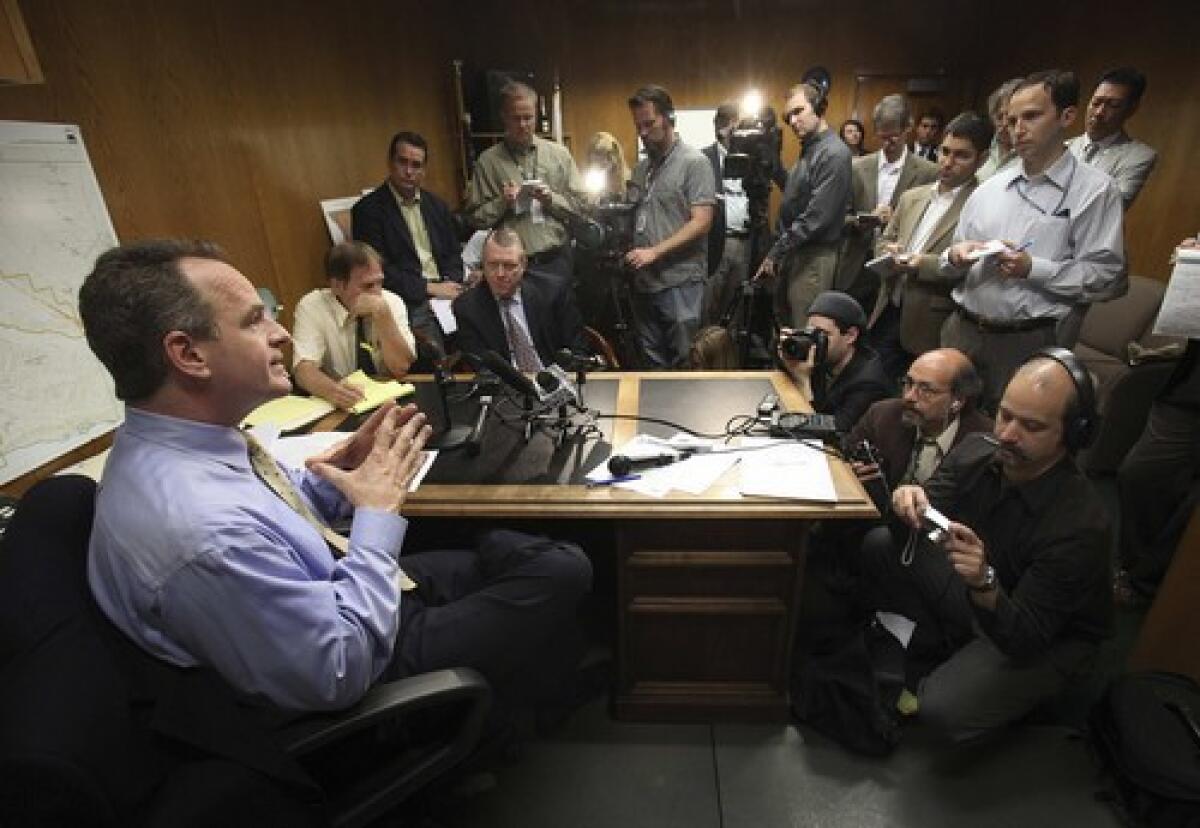California has no money and few options

Call it the Dance of Death, the Kabuki or the Summer Follies -- the performance they’re about to give in California’s Capitol is a necessary ritual. But it shouldn’t be taken very seriously by the outside world.
Both houses of the Legislature intend to debate the Democrats’ deficit-reduction proposal this week. They’re the majority party, but their budget plan has no chance of passing intact. It’s doomed by nearly $2.2 billion in additional tax increases, mostly on oil companies and smokers but also on motorists.
Gov. Arnold Schwarzenegger and Republican legislators have the power through the veto and the required two-thirds majority vote to kill any tax hike, and they’ll execute with relish.
Democrats expect to lose but will perform the dance anyway. It’s a compulsion, an exercise to reaffirm self-identity and exhibit values to patrons and constituents, such as labor unions. Participants get to preach and shout.
“Everybody dances around the fire. They throw stuff at us. We throw stuff at them. Everybody falls over dead, and we start all over again” is how a senior legislative staffer, Phil Perry, once described the dance to me.
Schwarzenegger calls it “part of the Kabuki.” But Kabuki is classic Japanese song-and-dance drama. These legislative act-outs give “classic” a bad name and hold zero drama. Observers will, however, hear some political song and dance.
Around the Capitol, such an exercise is derided as a “drill.” The goal of Democratic drill leaders will be to show the party troops that they’re fighting hard, even in the face of certain defeat preordained by last month’s election.
When the electorate emphatically rejected the Legislature’s and governor’s budget measures, it plunged the state nearly $6 billion deeper into debt and wiped out $16 billion in future tax hikes. Voters also sent Sacramento a loud message -- that was badly garbled.
Never has an election exit poll been so sorely needed. The Times conducted valuable exit surveys for three decades until cutbacks caught up with its polling operation. No outfit conducted one last month to ask people why they voted the way they did. So it’s anybody’s guess.
California’s two most prominent nonpartisan pollsters don’t even agree entirely on why voters were so grumpy.
Mark Baldassare, pollster for the Public Policy Institute of California, disputes the thesis that it was an anti-tax message, calling the notion “really a stretch.” Voters were mostly confused, he says.
Moreover, he asserts, the outcome “doesn’t reflect the will of the people” because only a puny 28% of registered voters cast ballots.
But the will of the people who don’t bother to vote never counts and is irrelevant.
Besides, contends Field Poll Director Mark DiCamillo, even if there had been a large turnout the ballot measures would have failed, based on preelection surveys.
DiCamillo argues that tax hatred was “pretty much what the vote was about. Why else were Republicans and conservatives so opposed? It had to be about taxes.”
Liberals may have rejected the ballot package because they feared its modest spending controls, but there’s only one pertinent point now. It is that Schwarzenegger and Republican legislators firmly believe that the electorate’s message was “no more tax increases -- live within your means.”
Republicans feel they’ve been warned and also empowered by voters. Democrats unquestionably have been weakened, thanks in part to their liberal pals who opposed the ballot props.
As all this plays out, everybody -- the politicians, the two pollsters -- agree that the voters’ overarching message was anti-Sacramento disgust: “Do your job, do it right and do it now.”
Don’t dawdle also is the message from state Controller John Chiang and Treasurer Bill Lockyer. They caution that the state will run out of cash by July 28 unless its budget is balanced in the next eight days. There must be enough time to arrange a short-term $10-billion bridge loan from bond investors, the officials say.
It’s OK to pause briefly for a death dance -- Democrats would be derelict if they didn’t -- but all performers should act civilized.
Commonly in these events, Democrats portray Republicans as obstructionists and uncaring kooks. Republicans denounce Democrats as socialist tax-and-spend addicts. Schwarzenegger feigns anger and spews insults. And it pollutes the atmosphere for serious negotiations. There’s no time for that offensive behavior this summer.
There’s little room to maneuver anyway. There are few options. There’s no money. And there’ll be no big tax increases.
You’d think the governor and Republicans, however, might find at least one Democratic tax idea acceptable. Schwarzenegger has proposed closing 220 state parks, roughly 80% of the total. Democrats suggest keeping them open by adding a $15 “parks pass” to the annual vehicle fee. Any car with a California license plate then would be allowed free park access.
In all, Democrats have proposed $11.4 billion in program cuts; Schwarzenegger $16.1 billion. The deficit hole is roughly $24 billion deep. Painful slashes are inescapable for K-12 schools, universities, children’s healthcare, programs for the aged and disabled -- practically every service the state provides.
“The cuts are coming,” says new Assembly GOP Leader Sam Blakeslee of San Luis Obispo. “The real question is what happens in the immediate aftermath.
“Will the public cry out for new taxes to restore the cuts, or cry out for significant reform that makes sure services are delivered more efficiently? I suspect it will be one of the great debates of our time.”
My bet: The public will cry out for efficiencies and consent to higher taxes when the horror stories unfold.
But this month’s script was outlined by voters May 19. The sorry episode’s ending should not surprise anyone.
More to Read
Start your day right
Sign up for Essential California for news, features and recommendations from the L.A. Times and beyond in your inbox six days a week.
You may occasionally receive promotional content from the Los Angeles Times.







